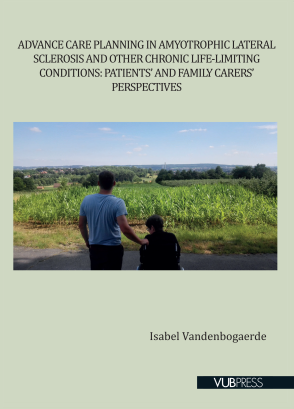Author: Isabel Vandenbogaerde
Date: 24-04-2023
Supervisors:
Prof dr Aline De Vleminck (Vrije Universiteit Brussel, Faculty of Medicine and Pharmacy) END-OF-LIFE CARE RESEARCH GROUP
Prof dr Luc Deliens (Universiteit Gent, Faculty of Medicine and Pharmacy) END-OF-LIFE CARE RESEARCH GROUP
Co-supervisors:
Prof dr Lieve Van den Block (Vrije Universiteit Brussel, Faculty of Medicine and Pharmacy) END-OF-LIFE CARE RESEARCH GROUP
Prof dr Jan De Bleecker (Universiteit Gent, Faculty of Medicine and Pharmacy)
NEUROMUSCULAR DISORDERS RESEARCH GROUP
SUMMARY OF THE DISSERTATION
People with chronic life-limiting illness such as Amyotrophic Lateral Sclerosis (ALS), dementia and cancer, develop a range of complex needs and symptoms for which a palliative care approach – in which advance care planning (ACP) plays a prominent role – has been widely advocated. ACP is an ongoing communication process in which individuals identify their values, reflect upon the meanings and consequences of serious illness scenarios, define goals and preferences for future medical treatment and care, and discuss these with family and healthcare professionals.
First, this dissertation gives insights into the complex and evolving process of ACP throughout the disease trajectory of ALS. Secondly, it investigates the involvement of family carers in ACP and their evaluation on the quality of end of life care. The results of this work show that ACP is a complex process in which medical, psychological and social factors are intertwined and cannot be seen as separate entities. This dissertation also reveals that about half of the family carers engage in ACP conversations with their loved one who lives with a chronic lifelimiting illness in the last three months of life. Most often they were supported by a healthcare professional who did the ACP conversation together with the family carer and the patient. Our results also show no significant difference in family carers’ psychological distress between family carers who received a structured ACP intervention and family carers who did not. This dissertation shows that family carers who received information on palliative or medical care tend to evaluate the quality of end-of-life care better than those who did not receive this information. Information provision is also seen as one of the first important steps in ACP. Finally, this work provides critical implications for practice, future research and policy for ACP in people with ALS, cancer and dementia.


